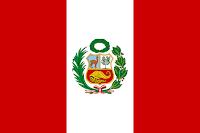
Despite the strikes, we got to Machu Picchu. Apparently the train had been cancelled some of the days before, but we were lucky. We were held up for half an hour whilst protestors blocked the line, but were soon through. On the way back, each carriage on the train had two riot police. They obviously expected trouble, but there wasn't any.
The afternoon after we arrived in Aguas Calientes, just below Machu Piccu, we walked up mountain Putucusi. The "walk" involves lots of steep ladders, but when you reach the summit you get a view across to Machu Picchu. It was quite exciting just to come over the summit and discover it there, you could almost imagine you were discovering it for the first time.
The next day we went to Machu Picchu itself. We arrived for dawn, but clouds meant that we missed the classic sunrise. Only 400 people a day are allowed to climb Huayna Picchu, the bigger peak behind Machu Picchu, so we made sure we were near the front of the queue for that. I was number 14 through the gate at 7.11am and decided to race to try and get to the top first. I ended up second to the top, after a German who had been first through the gate at 7am.

Once we were down, the sun came out we joined The Quest for the perfect photo of Machu Picchu, but we were no match for some of the tourists with their huge cameras and zoom lenses. As the day drew on, more and more tour groups were traipsing round the key sights of the site. But we found that Machu Picchu is impressive as a whole, for its setting, not for each individual wall or stone.
Despite the number of tourists, it is such a big site that it is actually quite easy to get away from everyone. You just nip round a corner away from the big attractions and you can have a corner of the lost city of the Incas all to yourself.
Machu Picchu itself is quite tastefully done - no people hassling you or endless gift shops - thankfully that is all confined to Aguas Calientes and Cusco. In Cusco, people ask you to buy things so often that it possible to buy t-shirts that say "No, Gracias".
These last few days travelling with people who have little or no Spanish has made me much more appreciative of what I have. When in Lima, I was always with Peruvians or volunteers who spoke better Spanish than me, and I was constantly wishing mine was better. But on the gringo trail amongst other travellers who spend all their times with other gringos I became aware just how much I have learnt.
The afternoon after we arrived in Aguas Calientes, just below Machu Piccu, we walked up mountain Putucusi. The "walk" involves lots of steep ladders, but when you reach the summit you get a view across to Machu Picchu. It was quite exciting just to come over the summit and discover it there, you could almost imagine you were discovering it for the first time.
The next day we went to Machu Picchu itself. We arrived for dawn, but clouds meant that we missed the classic sunrise. Only 400 people a day are allowed to climb Huayna Picchu, the bigger peak behind Machu Picchu, so we made sure we were near the front of the queue for that. I was number 14 through the gate at 7.11am and decided to race to try and get to the top first. I ended up second to the top, after a German who had been first through the gate at 7am.

Once we were down, the sun came out we joined The Quest for the perfect photo of Machu Picchu, but we were no match for some of the tourists with their huge cameras and zoom lenses. As the day drew on, more and more tour groups were traipsing round the key sights of the site. But we found that Machu Picchu is impressive as a whole, for its setting, not for each individual wall or stone.
Despite the number of tourists, it is such a big site that it is actually quite easy to get away from everyone. You just nip round a corner away from the big attractions and you can have a corner of the lost city of the Incas all to yourself.
Machu Picchu itself is quite tastefully done - no people hassling you or endless gift shops - thankfully that is all confined to Aguas Calientes and Cusco. In Cusco, people ask you to buy things so often that it possible to buy t-shirts that say "No, Gracias".
These last few days travelling with people who have little or no Spanish has made me much more appreciative of what I have. When in Lima, I was always with Peruvians or volunteers who spoke better Spanish than me, and I was constantly wishing mine was better. But on the gringo trail amongst other travellers who spend all their times with other gringos I became aware just how much I have learnt.











